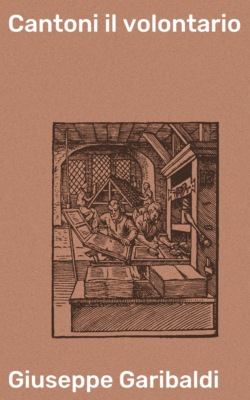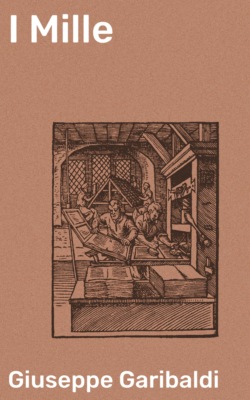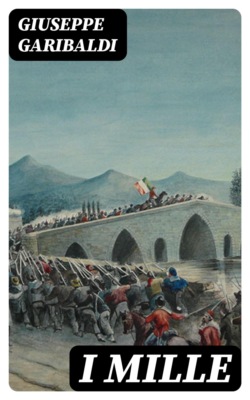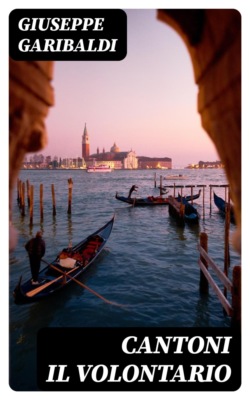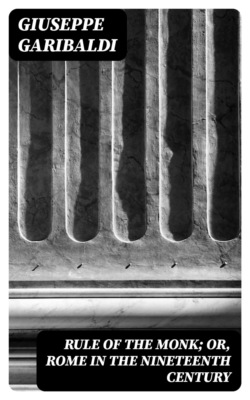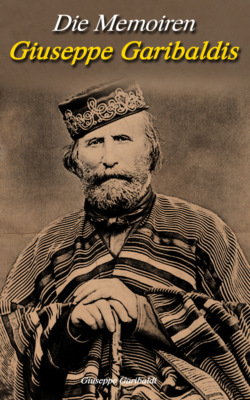Kitabı oku: «The Life of General Garibaldi», sayfa 8
CHAPTER XIX
PUBLIC DISMAY – ENTHUSIASM OF THE PEOPLE RISING – I RETURN TO MONTEVIDEO – OURIVES COMING TO BESIEGE IT – PREPARATIONS FOR DEFENCE – GENERAL PAZ – I AM ORDERED TO COLLECT A FLOTILLA – A FORTUNATE ACCIDENT
In the period which elapsed between the battle of Arroyo Grande and the beginning of the siege of Montevideo, that confusion prevailed which is common in such cases, when plans are by turns formed, rejected, and again adopted. Fear, desertion, and irresolution existed; but they were found only in rare and individual cases. The people stood firm and heroic, at the voice of noble-hearted men, who proclaimed that the Republic was in danger, and called upon all to rise in its defence. In a short time there was a new army, which, although neither so large nor so well disciplined as the former, was, at least, more full of energy and enthusiasm, and more strongly impressed with the sacred cause which impelled them. It was no longer the cause of a single man which stimulated the multitude: the star of that man had sunk in the late battle, and in vain endeavored again to rise. It was the cause of the nation, in the presence of which personal hatred and dissention were silenced. Foreigners were preparing to invade the territory of the Republic; and every citizen came out with arms and horses, to range himself under the banner, to repel him. The danger increased, and with it the zeal and devotion of that generous people. Not a single voice was heard to utter the word "submission," or "accommodation." Since the battle of Novara, in Piedmont, I could never compare my countrymen with the Montevideans without blushing. However, all Italy desired not to submit to foreign dominion, but panted for battle; and I am convinced that Italians, like Montevideans, possess constancy and generous devotion to liberty. But they have so many and such powerful influences to keep them enslaved!
I had then orders to sink the small vessels in the channel of the river, by which the enemy's fleet could come up. The larger vessels of the patriot flotilla were then not to be sunk, but to be burned; I was therefore soon engaged in burning a third fleet, but this was not to be done, as on the two former occasions, while fighting, my sailors having, consequently, once more been transformed into foot soldiers. I remained with them a few days in San Francisco, to allow time to ship for Montevideo the remaining materials of the army; and we then set off on the march for the capital, in the neighborhood of which all the forces were to be collected. Little or nothing of importance occurred on the journey, except my acquaintance with General Pacheco, then a Colonel in Mercedes. That illustrious Oriental commenced, at that dangerous crisis, to display a noble superiority in energy, courage, and capacity. He, beyond all question, was the principal champion of the gigantic struggle sustained by his country against foreign invasion; a struggle which will serve as an example to future generations, and to all nations who are not willing to submit to force; and may God protect the Oriental people!
Montevideo presented, at that time, a surprising spectacle. Ourives had conquered, and was advancing at the head of an army, which had passed through the Argentine provinces like a tempest, or rather like a thunderbolt. At the Coriolano of Montevideo, neither the prostrations of the priests would have availed, nor the tears of wives or mothers, to soften the hearts of the soldiers. The idea of chastising that city, which had driven him away, and seen him fly, gratified the soul of that atrocious man. The army of Montevideo had been destroyed, and nothing of it remained except small and disheartened fragments of forces, scattered over the territory of the Republic. The squadrons were cut in pieces, arms and ammunition were very scarce, or entirely wanting, and the treasury! It is only necessary to imagine it in the hands of such men as Vidal, intent on nothing but on getting doubloons, as the most portable kind of money for a meditated flight. He was Minister General.
It was, however, necessary to defend themselves. There were many men belonging to Rivera's party for whom there was no escape after the arrival of the others, and for whom the defence was an indispensable condition. But they were powerless and trembling, being bound to their employments and property. Yet the nation, the people, did not regard Ourives as the antagonist of Rivera, but as the head of a foreign army, which he led on for invasion, slavery and death; and they ran to the defence with a feeling of their rights. In a short time the army, in companies of cavalry, was made new. An army, chiefly consisting of infantry, was organized in Montevideo, to support the capital, and under the auspices of that man of victories, General Paz. That General Paz, whom envy, but no good cause at all, had driven from the command, replied to the call of his country in a time of danger, appeared at the head of the forces of the capital, and organized, with recruits and freemen, then emancipated by the Republic, that army which, for seven years, was the bulwark of the country, and still maintains itself in the presence of the most powerful enemy in South America.
Many leaders, forgotten and not fond of wars in which only individual interests were engaged, made their appearance in the files of the defenders, and increased the enthusiasm and confidence of the troops. A line of fortifications was to be drawn around the city towards the accessible part from the country, and they labored with alacrity until it was completed. Before the enemy's approach, manufactories of arms and ammunition, foundries of cannon, shops for making clothes and accoutrements for soldiers, all sprang up at once, as if by a miracle. Cannons, which, from the days of the Spaniards, had been judged useless, and placed as guards at the borders of the sidewalks in the streets, were dug out and mounted for defence.
I was appointed to organize a flotilla, for which several small vessels were chosen. A favorable incident proved very valuable to me, by enabling me to commence that armament. The enemy's brig Oscar, in sailing at night in the neighborhood of the coast, ran upon the point of the Cerro. That is the name of a mountain west of Montevideo, which forms, with its base, the western side of the harbor. In spite of every effort made by the enemy to get the vessel afloat, they were obliged to abandon her. We profited much by that shipwreck. From the first the enemy endeavored to prevent our saving her, and sent the sloop of war Palmar to cannonade us; but not obtaining much advantage from this, and the Republicans showing much obstinacy in seizing their prey, they soon left them at liberty to pursue their work.
Among the numerous objects removed from the wreck, were five cannons, which served to arm three small vessels, the first in the new flotilla, and which were immediately put to use in covering the left flank of the line of fortifications. I regarded the loss of the Oscar as a good augury of the terrible defeat which was preparing.
CHAPTER XX
THE ENEMY REACH MONTEVIDEO – GEN. RIVERA'S MOVEMENT ON THEIR LEFT FLANK – GEN. PAZ COMMANDS IN THE CITY – SERVICES BY THE FRENCH AND ITALIAN CORPS – TREACHERY – MISMANAGEMENT – GEN. PACHECO CORRECTS IT – ATTACK ON THE BESIEGERS – ITALIAN LEGION DISTINGUISHED – ANZANI – SERVICES OF THE FLOTILLA – A PROVIDENTIAL EVENT – COMMODORE PURVIS – BRITISH INTERVENTION – NEGOTIATION
It was now the 16th of February, 1843. The fortifications of the city had hardly had time to be completed, and to allow a few cannons to be placed, when the enemy's army made its appearance on the surrounding heights. General Rivera, at the head of the cavalry, although not strong enough to be able to fight them, had gone out and taken the field, turning the left flank of the enemy, and placing himself in their rear. That manœuvre, performed in a masterly manner, placed him again in a state to carry on the war with advantage. General Paz remained in command of the forces in the capital, which were numerous compared with the extent of wall which was to be defended. If, however, we regard the materials of which they were composed, who were raw recruits, and the pernicious elements at work, they could not be considered powerful. The constancy of the General, however, was displayed to the utmost, who sustained with them the first and most dangerous battles of the siege; and notwithstanding the generous spirit displayed by the people, there was no want of disturbers, cowards, and traitors. Vidal, then the Minister-General, had robbed the treasury, and run away. Antuña, colonel of a corps, and head of the police, deserted to the enemy, with many other civil and military officers. A corps, called Aguerridos, composed of foreigners hired by the Republic, in various affairs, had almost entirely deserted; and one night, when they occupied an advanced post, by their treachery they greatly exposed the security of the city. Such examples also were imitated by single individuals, who, from various motives, abandoned the files of the defenders, to pass over to the enemy.
Affairs did not go on well at first. I never knew why Ourives, who must have been well acquainted with occurrences, did not take advantage of such distrust and the bad state of the fortifications, to make a vigorous attack upon the place. He did nothing but make reconnaissances and false attacks by night. In the meantime foreign legions were organized and armed. In whatever way the spirit of the French and Italian legions may be viewed, it must not be denied that the first call to arms was answered by a generous rising, to repel the invasion of their adopted country: but afterwards individuals were introduced, whose interested views were quite on the contrary side. The organizing and arming of those corps, however, certainly availed in securing the safety of the city. The French, being more numerous and more excited by military display, soon had two thousand six hundred men under arms. The Italians assembled, in number five hundred; and, although they might seem few in proportion to the number in the country, and their education, I was surprised at seeing so many, considering their habits. They were afterwards increased, but never exceeded seven hundred.
General Paz, profiting by the increase of forces, established an exterior line, at the distance of a cannon-shot beyond the walls. From that time the system of defence was settled, and the enemy were no more able to approach the city.
While I had charge of the flotilla, with the organizing of which I was proceeding, Angelo Mancini was placed in command of the legion – a man of infamous memory; and he was accepted. The flotilla performed its first service in a sortie; and, as might be supposed, made no favorable figure. Italian bravery was despised, and I consequently burned with shame. The Legion was appointed to form part of an expedition to the Cerro; and I was to accompany it. General Bauza, an experienced and good soldier, but an old man, had the command. He appeared in the presence of the enemy, marching and counter-marching, without accomplishing any effect. It was, perhaps, prudent not to attack an enemy, who, if not more numerous, were more experienced and warlike. I endeavored to excite the veteran general, but in vain, when fortune sent General Pacheco from Montevideo, who was then Minister of War. His appearance gratified me very much, as I knew him to be an enterprising and brave man. We were soon acquainted, and I was treated by the new chief with confidence and familiarity. I requested leave to drive the enemy from a position beyond a ditch, which then served as a dividing line to the besiegers. He not only assented, but ordered General Bauza to support the movement of the Italian Legion. We attacked the left wing of the enemy, who fearlessly awaited us with a firm front and a terrible volley of musketry. But the Italian Legion was victorious that day. Although numbers fell wounded, their comrades pressed on fearlessly, and at length charged with bayonets, when the enemy fled, and were pursued to a considerable distance. The centre and right were also victorious, and took forty-two prisoners, besides killed and wounded.
That action, although of little importance in itself, was of very great value in its effects, – greatly strengthening the spirit of the Republican army, and diminishing that of the enemy, while it established, from that day, the military character of the Italian Legion. It was also the precursor of many great deeds performed by that corps, which was never conquered.
The next day the Italian Legion was in the principal square of the metropolis, in view of the whole population, receiving the praises of the Minister of War and the acclamations of all the people. The impressive words of General Pacheco had resounded among the multitude. I had never heard words more adapted to rouse a nation.
The Italian Legion had now fought for the first time and by itself, and there was that same Captain Giacomo Minuto who was afterwards captain of cavalry in Rome, and there received a wound in the breast from a ball, and died in consequence of loosening the bandages at the news of the entrance of the French.
Major Pedro Rodriguez also displayed much bravery.
From that day until the appearance of Anzani in the Legion, I absented myself but little from the corps, although engaged at sea most of the time. About that period Anzani was at Buenos Ayres, where, receiving an invitation from me, he came to Montevideo. The acquisition of Anzani to the Legion was extremely valuable, especially for instruction and discipline. Although he was much opposed by Manceni and by the second chief, who could not submit to acknowledge his superior merit, being perfect in military knowledge and direction, he systematized the corps on as regular a footing as circumstances would permit.
The flotilla, although of little importance, did not fail to be worth something to the defence of the place. Posted at the left extremity of the line of defence, it not only effectually covered it, but threatened the right flank of the enemy whenever it attempted an attack. It served as a link between the important position of the Cerro and the Island of Libertad, by greatly facilitating and coöperating in the attempts which were continually made upon the right of the enemy, who were besieging the Cerro. The Island of Libertad had been watched by the enemy, who laid a plan to get possession of it. Their squadron, under command of General Brown, was prepared to invade it and gain possession. It was determined that artillery should be placed upon it, and I transported to it two cannon, eighteen pounders.
About ten at night, that operation having been performed, I left the island with a company of my countrymen, and returned towards Montevideo. Then happened one of those unforeseen and important events which, I love to say, are evidently brought about by the hand of Providence. The Island of Libertad, placed in advance of the coast of the Cerro at the distance of less than a cannon-shot, is less than three miles from Montevideo. The wind blew from the South, and caused some agitation of the sea in the bay in proportion to its force, and especially in that passage between the island and the mole. I had embarked in a launch, purchased by the government, and had with me sailors enough to perform the service just executed, and the large lighter in tow, in which the artillery had been transported. Between the waves rolling in from the south and the weight of the boat, which was also exactly square in shape, we proceeded slowly, drifting considerably towards the north end of the bay, when, all at once, several vessels of war were discovered to the leeward, and so near that the sentinels were heard calling to the men, "Keep quiet!" It was doubtless the enemy's squadron.
We wonderfully escaped being captured by them; but the principal cause of our safety was, that the small vessels and the boats of the enemy had gone to attack the island, and there was nothing left that could pursue us. If this had not been the case, we should doubtless have been taken: but, more than this, the enemy did not fire a shot, though they might easily have sunk our little vessels, for fear of alarming their troops who had gone to the island, to surprise it. But what an escape it appeared to me when I reached the mole, and began to hear a terrible discharge of musketry on the Island of Libertad! I immediately reported the proceedings to the government, and then went on board my little vessels, to prepare them to go in aid of the troops on the island. They were only about sixty there, not well armed, and with but little ammunition. I set sail at dawn of day, with only two small vessels, called yates; the third, and only remaining one of the flotilla, not being fit for use at that time. We proceeded, and soon entered between the island and the Cerro, uncertain whether the enemy had got possession or not in their night attack. But the brave Italians, although taken unexpectedly, had fought with bravery, and had not only repulsed the enemy, but driven them back with much loss; and the corpses of Rosas' soldiers floated about in the waters of the harbor several days after. Having sent a skiff to the island to ascertain its fate, I soon received welcome intelligence of the successful resistance. I speedily landed the munitions, and one of my officers with some men to serve the guns; and this had hardly been accomplished when the enemy opened their fire, and the island replied with its two cannon. I then, with my two boats, got to windward of the enemy's vessels, and did all I could against them. But the combat was unequal in the extreme. I had against me two brigantines and two schooners, and one of the former had sixteen guns. The cannons on the island had platforms, and were ill-supplied with ammunition, and therefore did not fire well, or produce much effect. Had they been better provided for, they might have done good service. Although the sea was not very rough, it was sufficiently so to prevent the guns of my two little vessels from firing with precision; and, in short, it seemed impossible that the engagement could fail to be to the enemy successful. But once more God provided for us!
Commodore Purvis, then commander of the British station at Montevideo, sent a messenger to Brown, on account of which he ceased firing. From that moment the affairs turned to negotiation. The enemy's squadron left the harbor, and the island did not again fall into the power of another. Whatever the reasons of the Commodore may have been, it is undeniable that some degree of chivalrous generosity towards an unfortunate but courageous people entered into the sympathies and into the act of the philanthropic son of Albion. From that moment Montevideo knew that she had in the English Commodore not only a friend, but a protector.
CHAPTER XXI
EXPLOITS OF THE ITALIAN LEGION DURING THE SIEGE – TRES CRUCES – THE PASS OF BOJADA – THE QUADRADO – GENERAL RIVERA DEFEATED AT INDIA MUERTA, BUT WITHOUT DISCOURAGING EFFORTS, INTERVENTION CONTINUED – AN EXPEDITION IN THE URUGUAY, THE FLOTILLA BEING UNDER MY COMMAND
The affair of the island increased the fame and importance of the arms of the Republic, although its favorable result was more due to fortune than to anything else, and although nothing more was gained by defending it. Thus it was, that by insignificant, or at least small but successful enterprizes, a cause was fostered and raised up, which had been considered by many as desperate. A patriotic and excellent administration of the government, at the head of which was Pacheco; the management of the war by the incomparable General Paz; the fearless and powerful support given by the people, then purged from their few traitors and cowards; and the arming of the foreign Legions, – in short, everything promised a happy result.
The Italian Legion, whose formation was ridiculed by some, and especially by the French, had now acquired so much fame, that they were envied by the best troops. They had never been beaten, though they had shared in the most difficult enterprizes and most arduous battles.
At Tres Cruces, (the Three Crosses,) where the fearless Colonel Neva, from an excess of courage, had fallen within the enemy's lines, the Legion sustained one of those Homeric battles described in history, fighting hand to hand, and driving the troops of Ourives from their strongest positions, until they brought away the dead body of the chief of the line. The losses of the Legion on that day were considerable, compared with their small numbers, but on that account they gained more honor. That success, which seemed as if it might exhaust it, on the contrary fostered it exceedingly. It grew in numbers, with new recruits, soldiers of a day, but who fought like veterans! Such is the Italian soldier; such are the sons of the despised nation, when struck with the generous idea of what is noble.
At the Pass of the Bajada, on the 24th of April, was one of the most serious conflicts. A corps of the army under the command of General Paz, had marched out from Montevideo, passed by the right wing of the enemy, proceeded along the shore of the north bend of the bay to Pantanoso, where, joining the Republican forces of the Cerro, he intended to make a decisive blow on the enemy's army, – who were thus drawn out of their strong positions of the Cerrito, – to surprise two battalions, stationed on the shores of that marshy little stream. As that operation was not successful in consequence of a want of concert, they were obliged to go through the Pass, involved in a very sharp action. Of the two divisions comprising the corps, which were about seven thousand, that which formed the rearguard was so much pressed by the enemy, that, when recovered from surprise, they endeavored to regain their ground. This they would have saved with the greatest possible effort, in consequence of the extreme difficulty of the place. I commanded the division of the centre; and the general ordered me to re-pass and support the troops in that danger. I obeyed, but, to my surprise, found the battle a desperate one. The Republicans were fighting bravely: but the enemy had surrounded them, and then occupied a very strong salting establishment, (called Saladero,) between us and the rearguard, who had exhausted their ammunition. The head of the Italian column entered the Saladero, just when the head of one of the enemy's columns had entered. Then commenced a very warm contest, hand to hand; and finally Italian bravery triumphed. At that place the ground was encumbered with dead bodies; but my friends were safe, and the fight proceeded, with advantage to our side. Other corps came in to support them, and the retreat was effected in admirable order. The French Legion, on that day, going to operate simultaneously on the line of the city, was defeated.
The 28th of March, however, was highly honorable to the Republican arms, and to the Italian Legion. The movement was directed by General Pacheco. The enemy were besieging the Cerro, under the orders of General Nuñez, who had shamefully deserted to the enemy's files, in the beginning of the siege. They showed much boldness, and several times came up under the heavy ramparts of the fortress, threatening to cut off the communications with the city and destroying with musket shots the light-house erected on the upper part of the edifices. General Pacheco ordered several corps to be transported to the Cerro, among which was the Italian Legion. That movement took place during the night; and at the first light it was in ambush in a powder manufactory, half a mile from the battery. That edifice, although in ruins, had the walls standing, and afforded sufficient space to contain the entire Italian Legion, though in a somewhat confined situation. Skirmishing was commenced, and afterwards something more serious. The enemy stood boldly against their opponents, and got possession of a strong position called the Quadrado, or the Square, at the distance of a short cannon-shot from the Powder-house. A number of men had already been wounded among the Republicans, and, among others, Colonel Cajes and Estivao, in my opinion the best of the officers. Such was the state of things, when the signal was given for the Legion to make a sortie, and the conflict became serious, under the command of Colonel Carceres, who had charge of the force engaged. I shall always feel proud of having belonged to that handful of brave men, having always seen them on the high road of victory.
It was proposed to attack the enemy on an eminence, behind the shelter of a ditch and parapet. The space which it was necessary to pass, in order to assault it, was unobstructed by any obstacle, and therefore the enterprise was by no means an easy one. But the Legion, that day, would have faced fiends, if they could have been conjured upon the field; and they marched on against the enemy, without firing a shot and without hesitating for a moment, except to throw themselves into the Pantanoso, three miles distant from the field of battle. Nuñez was killed, and many prisoners were taken. The Oriental corps, in company with the Italians, fought very bravely; and, though the above-mentioned movement was somewhat retarded, the order was given to the column on the right to advance and place itself between the river and the enemy. And certainly not one of the enemy's infantry was saved.
That battle reflects great honor on the skill of General Pacheco.
During the first years of the siege of Montevideo, the Italian Legion sustained innumerable conflicts. They suffered the loss of many killed and wounded; but in no engagement did they disgrace themselves.
General Rivera was defeated at India Muerta; but the capital was not conquered with him. The corps belonging to it were trained to war by daily fighting, and also gained moral advantage over the besiegers. The English and French intervention took place, and then all parties anticipated a happy result of the war.
A project for operations, combined by the government and the admirals of the two allied nations, was an expedition in the Uruguay; and it was placed under my command. In the period now past, the national flotilla had been increased by the addition of several vessels, some of which were chartered, like the first, and others sequestrated from certain enemies of the Republic, and others still were prizes made from the enemy, who sent their vessels to the Bucco and other places on the coast in possession of the forces of Ourives. Then, between the acquisition of the above-mentioned vessels, and of two others of the Argentine squadron, sequestered by the English and French, and placed at the disposition of the Oriental government, the expedition for the Uruguay was composed of about fifteen vessels, the largest of which was the Cagancha, a brig of sixteen guns, and the smallest were several boats.
The landing corps was thus composed: the Italian Legion of about two hundred men, about two hundred Nationals, under command of Colonel Battle, and about a hundred cavalry, with two four pounders and six horses in all.

